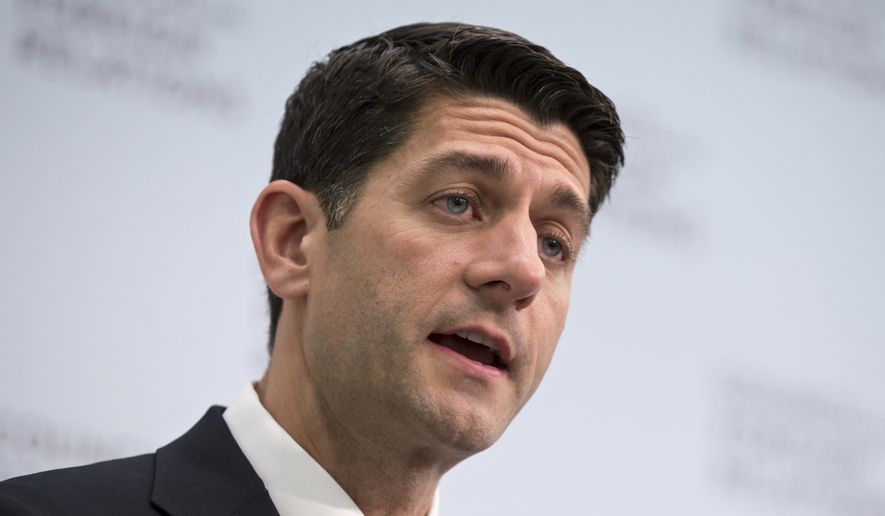Congress has yielded too much power to a federal bureaucracy that is unaccountable to voters and enabled by deferential courts, House Republicans said Thursday in a plan that seeks to reclaim their power of the purse and force the executive branch to explain its actions.
Speaker Paul D. Ryan, Wisconsin Republican, said Congress can fight back by asserting its power over spending and must prod agencies to “fess up” if they fail to enforce the laws Congress writes.
The Republican plan would rewrite regulations that are at least 70 years old and bolster Congress’ subpoena power so that agencies are forced to comply with investigations on Capitol Hill. It also says Congress should vote on rules that outgoing administrations issue in their final days.
The reforms are the fourth plank in the House Republicans’ six-point election-year agenda. The others are heavy on policy, while this one is more focused on procedures designed to restore what Republicans said was the vision of the country’s founders.
“Being free means you don’t have to worry about your rights being violated in the first place. That’s why we need the other branches of government, especially the legislative branch, to remain strong, so they can defend our rights when another branch attacks them,” Mr. Ryan said.
House Republicans also have released election-year proposals on poverty, national security and the economy. Still to come are blueprints to tackle tax reform and health care.
Dubbed “A Better Way,” the agenda is designed to unify the party, so it left out areas of disagreements such as immigration and trade reforms — two areas where Mr. Ryan clashes with presumptive Republican presidential nominee Donald Trump.
House Republicans introduced their latest plan in an hourlong event inside National Statuary Hall at the Capitol, providing a dynamic backdrop for speeches by more than a dozen members.
Their remarks reflected a Congress that is fed up with President Obama’s use of executive powers on health care, immigration and climate policy.
They singled out for criticism new water rules from the Environmental Protection Agency and a political targeting scandal at the IRS, saying leaders at both agencies resigned instead of facing the music or failed to respond to congressional inquiries.
“When we issue a subpoena, it’s not optional, folks,” said Rep. Jason Chaffetz, Utah Republican and chairman of the House Committee on Oversight and Government Reform.
Democrats said the rollout offered a smokescreen for House Republicans’ own dysfunction. The Republicans’ right flank accuses party leaders of failing to hold the line on spending and social issues.
“Again and again, House Republicans have obstructed the Congress, the administration and the courts, doing everything they can to put their radical, special interest agenda ahead of the priorities of the American people,” said House Minority Leader Nancy Pelosi, California Democrat.
The Republican plan calls on Congress to preserve its power over the federal purse by appropriating money the old-fashioned way: by writing a budget and passing a dozen annual spending bills.
Republicans pledged to sweep aside years of eleventh-hour spending deals and return to this process when they seized control of Congress last year, yet those bills have been mired in intraparty disputes over funding levels and policy disputes with Democrats.
House Appropriations Committee Chairman Harold Rogers, Kentucky Republican, said action would be easier if the Senate reconsidered the 60-vote threshold on appropriations bills so the minority cannot filibuster them.
“Whatever happened to rule by the majority?” he said.
• Tom Howell Jr. can be reached at thowell@washingtontimes.com.




Please read our comment policy before commenting.